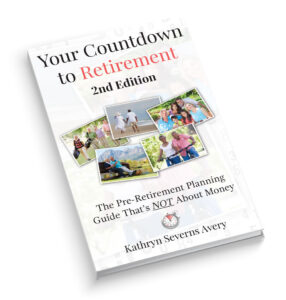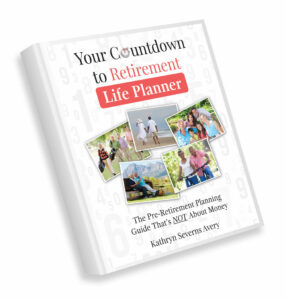It's Not Just About the Money!
The Best Laid Plans Evolve
-
Author : Your Countdown to Retirement
Date : April 8, 2016
Category : Redefining Retirement
Comments : 0
Like : 0

In the summer of 2014, my husband decided that May 1, 2015 would be his last day at his job. He plans to continue working part-time in a new field, so he will not be retired in the traditional sense. However, his decision to leave his current job requires us to plan for this transition.
For months I felt annoyed as he resisted my suggestions to sit down and brainstorm possibilities of what he could do after leaving his job and what we could do as a couple. I also noticed a shift in his behavior in general. He would get angry at things that normally didn’t bother him and for weeks was in self-described “funk.”
It wasn’t until we had a blow up about the topic and his resistance to talking about and planning our future that he realized he was feeling overwhelmed, fearful, and full of doubt. As a spouse it was painful to watch my normally confident husband deal with doubts and fears he keeps hidden. Revealing them to me made him, in his words, feel “weak and incompetent.”
According to therapist Cynthia Swan LPC, these feelings are a natural part of anticipating retirement and can intensify as the date gets closer.
“Baby Boomer men grew up in a generation where exploring their feelings was frowned upon,” she said. “Retirement is a major life change that can bring up conflicting emotions. As a result they may need time to recognize what they are feeling and why. If they don’t, it can lead to depression, malaise and acting out behaviors.”
Swan stressed the importance of keeping lines of communication open by actively being supportive and non-judgmental of the emotions that surface. “It may not be easy to stay centered when your partner is acting like a jerk. But it’s important to give them both the space and the support to work through what they need to work through.”
Once we identified and discussed the emotions my husband was feeling, we set aside an hour and wrote two pages of ideas to explore. Nothing was off limits and no criticism of ideas was permitted. In the following weeks the shift in my husband’s emotional state was dramatic. He is busily exploring possibilities, gathering information, and making contacts. “I’m actually beginning to feel excited about this next phase of life,” he said recently. A major change, indeed.
Tips:
In a marriage or committed relationship, both partners need to be involved in the retirement planning process. Be pleasantly persistent in requesting time to discuss retirement plans with your spouse or significant other. If you’re single, enlist the help of a trusted friend or family member to help you brainstorm post-retirement possibilities.
Lack of structure is often cited as one of the pitfalls of retirement life. What routines can you establish to provide “anchors” during the retirement transition process? Creating a plan for the first six months of retirement provides comfort and stability without feeling overwhelmed. With what you learn from your first six months you can create a plan for the next six months.
Acknowledging the stress caused by change reduces overwhelm and allows excitement, resilience, and hope to emerge.





